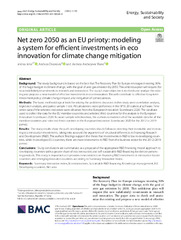Приказ основних података о документу
Net zero 2050 as an EU priroty: modeling a system for efficient investments in eco innovation for climate change mitigation
| dc.creator | Ješić, Jelena | |
| dc.creator | Okanović, Andrea | |
| dc.creator | Andrejević-Panić, Andrea | |
| dc.date.accessioned | 2023-04-07T14:27:49Z | |
| dc.date.available | 2023-04-07T14:27:49Z | |
| dc.date.issued | 2021 | |
| dc.identifier.issn | 2192-0567 | |
| dc.identifier.uri | https://redun.educons.edu.rs/handle/123456789/436 | |
| dc.description.abstract | Background: The study background is based on the fact that The Recovery Plan for Europe envisages investing 30% of the huge budget in climate change, with the goal of zero gas emission by 2050. This ambitious plan will require (for now indefinitely) investments in research and innovation. The study's main objective is to check and analyze the existing and propose a new model of effective investments in eco-innovation. This will contribute to effective long-term investment policy, climate change impact, and mitigation of consequences. Methods: The basic methodological tools for solving the problems discussed in this study were correlation analysis, regression analysis, and paired sample t-test. All calculations were performed in the SPSS 20 statistical software. Time series data of the selected indicators were obtained from the European Innovation Scoreboard 2020. The database used to collect the data for the EU member countries and selected third countries for the analysis is the European Innovation Scoreboard 2020. To avoid sample selection bias, the authors considered all of the available data for all the member countries and selected third countries in the European Innovation Scoreboard 2020 for the 2012 to 2019 period. Results: The study results show the path developing countries should follow in directing their inevitable and increasing eco-innovation investments, taking into account the arguments of structural differences in financing Research and Development (R&D). The authors' findings support the thesis that investments in R&D is low in developing countries, while in developed EU countries, there are more investments in R&D from the business sector for the 2012-2019 period. Conclusions: Study conclusions are summarized as a proposal of the appropriate R&D financing model approach to developing countries with a greater share of eco-innovation and self-sustainable R&D financing for climate preserving products. This study is important as it provides new evidence on financing R&D investments in innovation leader countries and emerging innovator countries according to Summary Innovation Index. | en |
| dc.publisher | BMC, LONDON | |
| dc.relation | info:eu-repo/grantAgreement/MESTD/inst-2020/200156/RS// | |
| dc.rights | openAccess | |
| dc.rights.uri | https://creativecommons.org/licenses/by/4.0/ | |
| dc.source | Energy Sustainability and Society | |
| dc.subject | Sustainable R&D financing | en |
| dc.subject | Summary innovation index | en |
| dc.subject | Net zero | en |
| dc.subject | Knowledge management | en |
| dc.subject | EU | en |
| dc.subject | Eco-innovations | en |
| dc.subject | Developing countries | en |
| dc.title | Net zero 2050 as an EU priroty: modeling a system for efficient investments in eco innovation for climate change mitigation | en |
| dc.type | article | |
| dc.rights.license | BY | |
| dc.citation.issue | 1 | |
| dc.citation.other | 11(1): - | |
| dc.citation.rank | M22 | |
| dc.citation.volume | 11 | |
| dc.identifier.doi | 10.1186/s13705-021-00326-0 | |
| dc.identifier.fulltext | http://redun.educons.edu.rs/bitstream/id/241/433.pdf | |
| dc.identifier.rcub | conv_1102 | |
| dc.identifier.scopus | 2-s2.0-85121331490 | |
| dc.identifier.wos | 000730217500001 | |
| dc.type.version | publishedVersion |

